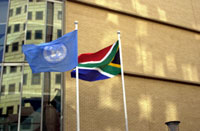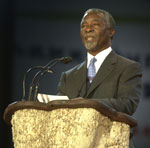Tom Turner is in South Africa at the World Summit on Sustainable Development to edit a daily news report, Eco, on behalf of a coalition of civil society organizations. He is senior editor at Earthjustice, a nonprofit public interest law firm.

Monday, 26 Aug 2002
JOHANNESBURG, South Africa
Boasting the slogan “People, Planet, Prosperity,” the World Summit on Sustainable Development has come to South Africa with a vengeance. It is the biggest event the nation has hosted in years, and is expected to be the largest U.N. conference ever held. Sixty-five thousand people are attending, ranging from delegates to reporters to interested observers. (The Sandton Center, where the official events are being held, can accommodate only about 7,000, which seems like a recipe for trouble.)
In hosting this conference, the U.N. is celebrating — if that’s the right word — the 30th anniversary of the first big international environmental bash, held in Stockholm in 1972. It’s also marking the 10th anniversary of a similar summit held in Rio de Janiero in 1992, when there was a different George Bush in the White House. (Different in more than years; light-years different in policies and attitude.)
I’m attending the summit to work with an eclectic coalition of a half-dozen heavy-hitting groups that make up part of what is called, these days, “civil society.” That means not government, not press, and not commercial interests. Civil society used to be known as NGOs — nongovernmental organizations — until businesses decided that they, too, were NGOs and began to muddy the waters.

Tom Turner at work in Johannesburg.
This coalition will be publishing a daily news report to let people know what’s happening at the far-flung meetings, events, and demonstrations of the WSSD; the report will also feature the opinions of well-informed observers about what is right, wrong, and missing in the proceedings.
The first of these reports appeared 30 years ago in Stockholm and spawned a series of editions now numbering well over 100. These reports have investigated the inner workings of the U.S. nuclear industry, the International Whaling Commission, the Antarctica Convention, U.N. conferences on food and human settlements, and a host of other important but underreported gatherings.
As with so many of those past gatherings, it looks as if this will be another event where being American is not something to be entirely proud of. Selfish is not too strong a word for the way the U.S. delegation has been acting and is expected to act during the conference. There is one school of thought — actually quite a compelling one — that holds that the U.S. doesn’t just want to ensure that no substantial international agreements emerge from the WSSD; it also wants to use the conference to diminish the power and influence of the U.N. in favor of, for example, the World Trade Organization. The Bush administration is also pushing for partnerships between the public and private sectors, with only the most vague of voluntary systems to protect natural resources, human rights, and other concerns that are generally the province of governments.
This is Reaganism writ large, and it is pushed incessantly by the current administration both at home and abroad; it is sure to be promoted here with equal gusto. Luckily, there are tens of thousands of ordinary citizens here with other ideas in mind. It should make for a frothy two weeks.
Tuesday, 27 Aug 2002
JOHANNESBURG, South Africa
The World Summit on Sustainable Development opened yesterday with the election of South African president Thabo Mbeki as titular president of the proceedings. In a reference that could have been aimed at the U.S. and its apostasy on the Kyoto Protocol on climate change, Mbeki said, “It is no secret that the global community has, as yet, not demonstrated the will to implement the decisions it had freely adopted.”
International concerns were at stake, but local newspapers chose to emphasize the issues more immediate to the conference: worries about possible disruption by protesters and unhappiness among delegates about the restricted access to the conference center. Some 25,000 people hold valid passes to enter the center — where attendance is limited to 6,000. One woman from the Sudan told the Star newspaper that her village had worked for eight months to get together the money to send her to the summit and now she couldn’t get in. On the protest front, published reports say that Saturday’s big demonstration will feature President Mbeki, Fidel Castro, and Yassir Arafat. The police are nervous.
Meanwhile, jockeying continues over a wide variety of issues, from attempts to hold corporations accountable for their activities to whether the so-called “precautionary principle” will survive. (Must a technology be proved safe before being put to use or is the burden of proof on the worriers?) Another major issue is whether the summit should endorse what are being called Type 2 agreements: voluntary partnerships between businesses and governments with no formal or enforceable oversight or control. These agreement are seen by many civil society observers as an abdication of government responsibility in favor of the voluntary policies favored by the Bush administration — as in the recent “Clear Skies” initiative put forward by the U.S. EPA. Clear Skies would supplant many enforceable deadlines and programs of the Clean Air Act and replace them with voluntary, unenforceable programs.
Finally, security is tight as a tick for the summit. In part, that’s because of all the inviting political targets soon to arrive here — but everyday life in Johannesburg is no picnic, either. Here are the headlines from one page of Monday’s issue of the Citizen, a Jo’burg daily:
Couple Hacked to Death Killed for a Loaf and Booze Man Burns Down Six Houses Head and Corpse May Be Linked Alleged Cop Killer Still at Large Tip-Off Leads to Arrests Cop Kills Himself Zimbabwe Trio Up for Corte Shooting Metro Cops Hurt in N1 Accident
Makes Detroit sound positively serene.
Wednesday, 28 Aug 2002
JOHANNESBURG, South Africa
The most dire predictions about U.S. plans to sabotage the World Summit on Sustainable Development seem to be coming true. Late last night, American negotiators began to systematically disembowel the language that will govern the “System of Implementation,” which is where the rubber meets the road. Even if the summit adopts high-flying language about goals and commitments, not much will actually get done if the System of Implementation is gutted. Perhaps there will be a backlash.
The actions of the U.S. negotiators came hand-in-hand with the news that U.S. Trade Commissioner Robert Zoellick is about to file a complaint with the World Trade Organization alleging that the European Union ban on genetically modified food imports from the U.S. violates WTO rules. This is sure to spark another trade battle and keep relations frosty. While the U.S. and the E.U. may scuffle over the details, trade does seem to be the force driving the negotiations here so far. As reported in today’s Eco, “There is more about this summit that is reminiscent of Seattle than the circling helicopters and searchlights. Increasingly, it seems, we are negotiating a trade text, with other issues relegated to the periphery. Are environmental and poverty-reduction interests once again being hijacked by the short-term demands of trade ministries and special-interest lobbyists?” We’ll keep an eye out.
Meanwhile, working in the nerve center of the Eco-Equity coalition is quite an amazing experience. The space, just across from the entrance to the conference center, consists of a small suite of offices meant to house six to eight people; it’s currently home to a floating contingent that averages 15 or 20 at a time. We hail from the U.S., Britain, the Antipodes, and Europe (an inordinate number of Aussies and Danes), as well as Greece, Lebanon, Brazil, Chile, Japan, South Africa, Canada, the Philippines, and include people who travel so much they hardly have a place to call home. Everyone has at least one cell phone. Many have one for local calls, another for overseas calls. Phone calls flood in from reporters all over the world, and at any minute you can hear radio interviews being conducted in three or four languages. When these people aren’t talking to the press, they’re out lobbying delegates, plotting press conferences and political strategies.
The energy level here is of Kilomanjarian proportions, and people feed off each other’s adrenalin. And their influence is quite remarkable. This is a group that has been together since the global-warming meetings in Kyoto, and people know the territory and each other well. They may not be able to match the bigwigs’ budgets, but they make up for it with passion and the knowledge that they’re on the side of the angels. I feel honored to be part of the group.
Thursday, 29 Aug 2002
JOHANNESBURG, South Africa
We are in the dog days of the Earth Summit here in Johannesburg. The excitement of the opening ceremony has passed, and three days of nongovernmental organization testimony by experts and activists — on water, energy, health, agriculture, and biodiversity — has concluded, while the real horse-trading continues on behind closed doors far into the night. A massive horde of reporters is swirling about, looking for something to report, and myriad groups are only too happy to supply new books and reports and studies at press conferences and receptions. News flashes and event announcements pop up on my email every few minutes, or so it seems.
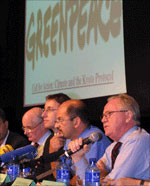
Left to right: Charles Nicholson, British Petroleum; Achim Steiner, IUCN; Remi Parmentier, Greenpeace; Bjorn Stigson, WBCSD.
Photo: Greenpeace.
One such news flash that garnered considerable attention last evening was a joint statement by Greenpeace and the 160-member World Business Council on Sustainable Development. The latter group includes some companies generally considered environmental scofflaws — Royal Dutch Shell and British Petroleum being the most prominent — and it has had a difficult relationship with the environmental community since its founding several years ago. But the overwhelming desire of most of the nations of the world to get a handle on global warming and to persuade the U.S. and the few other holdouts to ratify the Kyoto Protocol (or something like it) caused the council to join forces with Greenpeace and push for decisive action. Both groups acknowledge their differences and insist this is a single-purpose marriage of convenience. And both groups see the humorous side of the alliance. Remi Parmentier of Greenpeace ended the announcement with an appeal to the group’s new business partners: “Next time you see one of us climbing one of your chimneys or unfurling a banner, call me instead of the police.”
In other news, Yves Lador, who represents Earthjustice at the U.N. Human Rights Commission in Geneva, is currently in Johannesburg to try to rescue a couple of key paragraphs in the declaration the summit will adopt some time next week. The paragraphs in question reiterate the U.N.’s commitment to the proposition that a livable environment is a basic human right. This seems too obvious to argue about, but the implications of such language are pretty harrowing to some conference-goers, apparently. The good guys in this struggle are the European Union, Norway, Great Britain (whose position has changed 180 degrees in the past few years), New Zealand, and a few others. The G-77 (developing countries and China) is trying to block any mention of human rights in the final document. The hard-liners are led by an unholy alliance of Iran, Venezuela, Nigeria, China, Egypt, Algeria, and a few other countries that consider human rights a license for outsiders to meddle in their affairs.
Yves says that he and his human-rights allies are trying to crack the G-77 solidarity and think they may have found an opening. The U.S., once again, is a stumbling block; it seems unwilling to push for the necessary language. The risk here is that if the summit does not at least make reference to human rights, a great deal of essential work in Geneva and around the world will be lost.
Friday, 30 Aug 2002
JOHANNESBURG, South Africa
I’ve avoided deluging you Grist readers with numbers thus far, but today Eco came up with a few that speak volumes — so here they are, Harper’s Index style. (The source is the U.N. Development Programme.)
- $6 billion: Amount needed per year to provide a basic education for everyone in the world who does not currently have access to one.
- $8 billion: Amount spent per year in the U.S. on cosmetics.
- $9 billion: Amount needed per year to provide basic water and sanitation services for everyone in the world who does not currently have access to them.
- $11 billion: Amount spent per year on ice cream in Europe.
- $11 billion: Amount needed per year to provide basic health and nutrition for everyone in the world who does not currently have access to them.
- $17 billion: Amount spent per year on pet food in Europe and the U.S.
No further comment necessary.
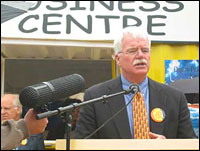
Rep. George Miller.
Photo: Greenpeace.
Meanwhile, the U.S. held an A-list press conference yesterday at which it touted a series of so-called “partnership” programs (among government, industry, and NGOs) to help eradicate AIDS, feed the world, abate air pollution, encourage energy conservation, and save the Congo Basin. This is all well and good, but it turns out that most of the programs exist or had been promised already, so there’s no net gain for the objective of sustainable development. This caused Rep. George Miller (D-Calif.), who has come to offer a welcome counterpoint to many of the positions staked out by the U.S. delegation, to quip, “The greenest thing the United States is doing at the summit is recycling old ideas and old money.”
In cheerier news, a breakthrough on energy occurred yesterday when officials from Brazil, Mexico, Norway, Argentina, and the Philippines broke ranks with many of their colleagues and announced support for a Brazilian initiative to commit the world to moving toward a global economy with at least 10 percent of total energy supply generated by “new” or “real” renewables. If you’re wondering why those words are in quotation marks, it’s because there has been much squabbling over definitions: Should “renewable” energy include huge hydroelectric projects, burning dung, even nuclear power, or should it be confined to more benign sources such as solar, wind, geothermal, and modern, sustainable biomass? Brazil and its nascent coalition have stepped up to the plate and are pushing the right line, as our British colleagues would say. More power to them.
Tuesday, 3 Sep 2002
JOHANNESBURG, South Africa
One hates to be downbeat, one really does. One likes to seek silver linings, lights at ends of tunnels, that sort of thing. But damn if there’s much to praise coming out of this ponderous mess of a conference.
By way of comparison, in Stockholm 30 years ago, there was zeal, passion, fire, hope. Delegates seemed genuinely to care, and observers came to promote their own causes whether they were on the conference agenda or not: Vietnam, nuclear power plants, whaling. In fact it was at Stockholm where the crusade that eventually led to the moratorium on commercial whaling began; the momentum generated there eventually overwhelmed the International Whaling Commission. It’s hard to imagine anything remotely close coming out of Joburg.
The final touches were put on the “Plan of Implementation” yesterday. The best single element of the plan, perhaps, is a pledge to halve, by 2015, the number of people lacking clean drinking water or sanitation. A noble goal, but 2015 is a long way away and much will change by that time. Other suggested goals — a decisive move toward renewable energy, a recommitment to the precautionary principle, a move away from subsidies for agriculture and nonrenewable energy systems, a rethink of free trade, a reaffirmation of the link between human rights and the environment, and many others — were lost or watered down beyond recognition in the final text of the plan.
The plan has yet to be approved by world leaders, and it will be interesting to see what happens. As Eco noted today, the grand speeches delivered yesterday by various heads of government (HOGS, to the snide and in-the-know) and continuing this week (Colin Powell is on tomorrow) bear very little resemblance to the actual words in the plan those same leaders are about to sign. There’s some chance the declaration will be improved, I suppose, but I wouldn’t bet on it.

Mary Robinson.
Photo: IISD.
Still, to try to end on that silver lining I despaired of starting with, I’ll mention the human rights workshop I went to Sunday morning. My fellow workshoppers included, among others, the outgoing U.N. High Commissioner on Human Rights, Mary Robinson. Robinson, a former president of Ireland, is a compelling and dynamic woman who has just been forced from her position under pressure from — you guessed it — the United States. She (and many others) is worried that human-rights language may disappear from the summit declaration that’s still being haggled over. But she added one note of hope, saying that she’d been to lots of these conferences and has learned that it is not unusual for things to turn around at the last minute. We’ll cross our fingers.
Wednesday, 4 Sep 2002
JOHANNESBURG, South Africa
And so the postmortems begin. Was the summit a success? (Very few votes for that among those who aren’t on the U.S. delegation or involved with the World Trade Organization). Have big conferences like this one outlived their usefulness? (Split decision, with the ultimate answer being that it doesn’t matter: As long as shindigs like this one are thrown, one must attend to control the damage, if nothing else. (Although we did catch a glimpse of Vandana Shiva, a powerful activist from India, who was sporting a sticker reading “No More Summits.”)
Is there anything positive to take home? On the concrete, measurable side, the answer is a qualified no. It could have been worse, but not much. On the unquantifiable side, the answer is certainly yes. Thousands of people converged here from all over the world, and new friendships and alliances were made that will bear fruit in the future. In fact, the most important work at gatherings like this one goes on in the corridors and in the bar and at the unofficial sites where the unofficial participants congregate. Johannesburg will not go down as a shining moment in the history of environmental progress, but the people who attended aren’t likely to forget it.
In short, although people will be sifting through the ashes for some time and life will go on, a milestone this was not. If the environment survives, it will be despite this conference rather than because of it.
Of the final moments of the conference, perhaps the most interesting was the (short) speech by U.S. Secretary of State Colin Powell, who made his appearance late this morning. He followed a string of leaders proudly stating that they had signed the Kyoto Protocol, the international agreement to control global warming, which the U.S. has refused to sign and tried to torpedo. (The U.S. suffered a setback yesterday, when China and Russia both announced that they will soon ratify Kyoto, which should be enough for it to take effect despite U.S. resistance.)
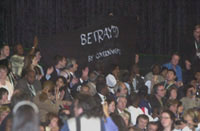
Betrayed by governments banner.
Photo: IISD.
In his speech, Powell said the U.S. is devoted to sustainable development and is committed to helping other countries improve their lot. “Our well-being depends on the well-being of the rest of the world,” the secretary said, though the rest of the world remains skeptical. He then said that famine-afflicted countries that refused food aid because it included genetically modified organisms were crazy. “That food is safe,” he said, to boos from the crowd. At that point, several people stood up in the gallery and unfurled banners reading, “Shame on Bush,” and “Betrayed by Governments,” while the chanting and heckling rose in volume. Security guards appeared and several people were hauled away.
At least it provided a diversion from the tedium of most of the speeches. Powell said the U.S. is in favor of renewable energy, of improved prospects for women, and of reduced greenhouse gas emissions (more jeers). He repeated that the administration will ask Congress for $5 billion in new aid funds, and then left the podium to a mixture of applause and boos.
The last item of business is approval of the political declaration, which has been shepherded this week by President Mbeki of South Africa and nibbled to death by a thousand nitpickers. Once it’s passed, the analysis will begin. You can read the declaration and draw your own conclusions.
Thanks for reading and apologies if I’ve been too gloomy. We’ll persevere — because we must.
